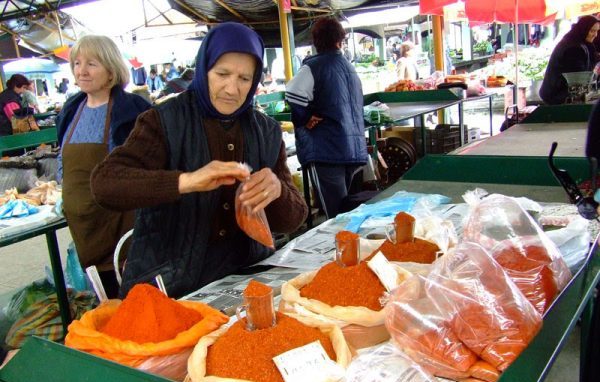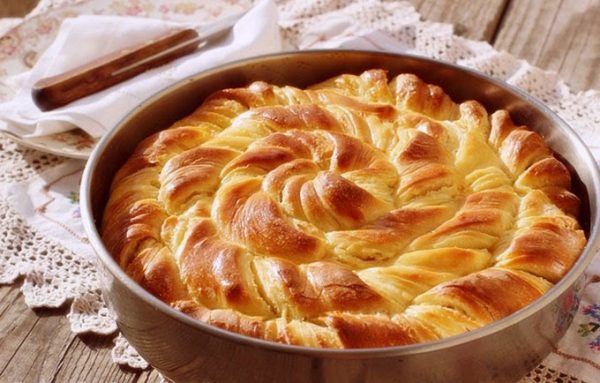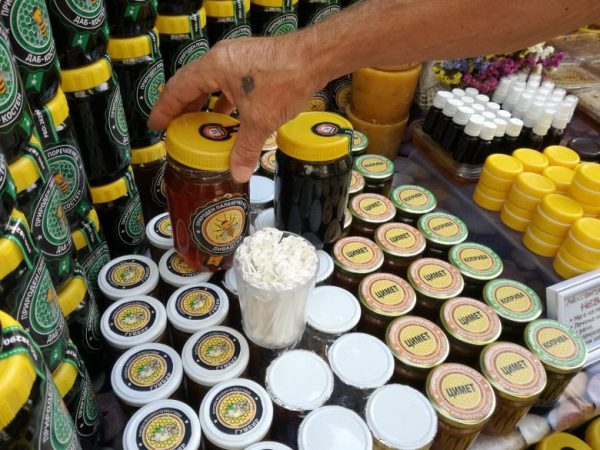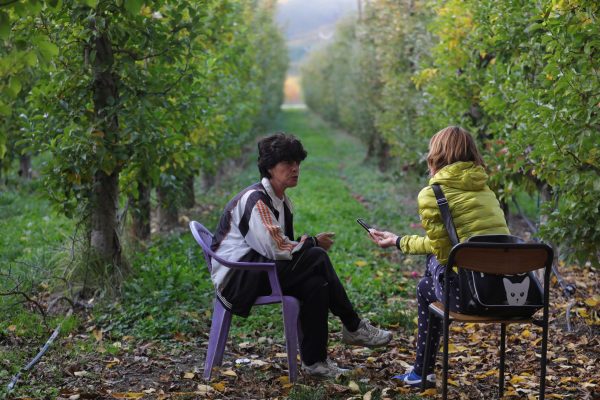Cheeses, jams and marmalades, honey, fish, dips, spices and homemade baked goods are a small part of the wide array of traditional products that our farmers, especially those from rural places, can sell legally, from their homes or farms.
This has been stipulated with the recently adopted two rulebooks for food of animal or non-animal origins, which significantly loosened production and processing conditions. These rulebooks impose basic, elementary hygienic criteria that must be met. Do farmers know this, though? Have they been well acquainted with the minimal conditions and standards they’re being asked to meet? On the other hand, how much trust do consumers have in these products? How will they know that what they buy is safe for consumption and has guaranteed quality?
For now, the Registry of Facilities and Food Operators for the primary production and processing of animal-based produce registers 296 producers. Of those, 293 produce honey and bee-related products. The remaining three process milk of their own farming grounds, such as goat and sheep cheese, egg and quail egg production, as well as gathering and processing big game meat. The Registry is in its initial creation stages. Registering this category of producers is now done through the district units of the Food and Veterinary Agency (AHV). Three operators have been registered in this category – one from Valandovo who processes organic fruits and produces vinegar, one who traditionally produces wine in Strumica, and one who dries fruit in Ohrid.
According to field data, additional training and informative meetings are necessary, especially with residents of areas that are not well developed. Most producers believe that the effects of the rulebooks will be visible possibly next year because they’re too recent to yield any results yet. Consumer trust is individual and mainly reduced to the recommendation principle. If someone bought cheese from someone else and is satisfied with their purchase, they will talk about their experience to their family and friends. That’s how the production network grows.
“The rulebooks largely loosened production conditions. Hygiene is the basic criteria. Then, special rooms are necessary depending on the type of production, stainless steel containers, water, washing ability, and keeping it clean at all times. These are the basics that any dairy farm, regardless if it’s in a village, city, or mountain,” Skender Ame, president of the Deshat Association of Debar Herdsmen, that sells his entire quantity of cheese produced over one year – around 2000 buckets, 14 tons, from home.
Ame points out that herdsmen must have a registered cattle pen with the AHV to produce cheese and milk.
“The AHV asks for concrete conditions such as hygiene, cleaning, stainless steel containers. There are regular inspections. They happen often here because I’m a registered producer. Inspectors come by and judge if I should take my cheese to the Institute for Animal Husbandry or where there’s a milk control lab. Milk controls are done at least once during lactation, and the milk can be taken in for testing twice or thrice,” Ame explains.
For lamb slaughter, he adds, there needs to be a clean concrete surface, as opposed to a tile surface. The lamb cannot be slaughtered in the mud,” Ame says, adding that it’s a basic criteria to register the cattle, make sure they have paperwork and passports. Without it, there is no production or sales.
“I have regular customers that have been buying my cottage cheese and traditional white cheese for 23 years. They know that the products are safe and secure, and above all, they know that they are quality products, too. Of course, I also have certificates from the AHV that my cattle has been vaccinated. At any rate, I would say, if it’s quality it works. Anything traditional, Macedonian, is good,” he says.
Honey producer Goran Aleksovski, member of the Macedonian Honeybee Association – MakBi, judges that the effects of the rulebooks’ application should be anticipated next year, at least in terms of beekeeping. He’s not yet registered for household selling. Aleksovski has submitted a request for the Young Farmer measure, and when he gets it, he plans to equip a plant and get registered for selling.
“I don’t know how many registered beekeepers there are, nor what their experiences are. I think the rulebook was adopted last year, but very few beekeepers were acquainted with it. The strategy was almost underdeveloped for the producers to be informed and acquainted with it. Now there’s a more aggressive campaign, and I know several beekeepers have been registered already. The thing is, there was little honey this year, so we can’t estimate who sold how much. Maybe we can expect results next year and then we can see where we stand,” Aleksovski says.
He believes that the rulebooks make production conditions more flexible, especially for small-scale producers.
“They require easily maintainable floors and walls, the material isn’t listed anywhere so there are no restrictions against tiles or laminate floors. In fact, this allows us to find materials for affordable prices without restricting us to, let’s say, a centrifuge that costs 2,500 euros or 300 euros, it just needs to be made of stainless steel. There are plenty of alleviating factors,” Aleksovski says, adding that consumers can’t buy from just anyone.
“The consumer should be acquainted with the producer, because when it comes to honey, many certificates can be forged. I believe that the rulebooks will have significant influence here, and they will help surpass the recommendation step, because it’ll be more legally regulated,” Aleksovski says.
Production constancy should not be expected of producers
Frosina Gjorgievska, national coordinator of the Network of Women Farmers at the NFF, delegated to participate in the rulebook production as a technologist, agrees that the rulebooks simplify the conditions the farmers should meet, but they should not be expected or demanded to have production constancy.
“When we make something at home, it turns out different, like dog rose jam, for example. There’s no possible way for the quality to be the same. You can’t expect it from big producers with all the possible certificates, either. There are products of dubious quality found often on the market, even though their date is relevant, but the label doesn’t match what’s within the packaging,” Gjorgievska says.
She and a few more women make various jams, marmalades, jellies, compotes and juices from produce they process in the Prespa region, such as apples, blackberries, dog roses and blueberries. They’re working online, through a Facebook page through which they offer and advertise their products, but they hope for recommendation based selling.
“I think that approach yields more results. Offering is an option, but it’s another thing when someone tries the products, likes it, and recommends it to someone else. I’d second-guess myself if I were buying something that I only read about on the internet,” Gjorgievska says.
She says that the rulebooks will motivate women from rural environments to start processing some of their produce.
“I want to highlight that lots of training will be necessary, as well as more awareness. Women from rural environments rarely come across such information. When I was a trainer for gender equality in Makedonski Brod, more than half the time was spent talking about measures the state offers, that they’re not taking advantage of due to a lack of information. The people must be told all the ways they can work and attain profits. This is, above all else, good to help time pass by quicker in rural environments,” Gjorgievska says.
She highlights sales rulebooks from Slovenia, taken over from the Austrian model, as especially good.
“They’re working with a kind of rural tourism that centers around hotels and restaurants. I had the chance to stay there, and we were situated in a small place, and the fact that we got our breakfast from local producers – jam, honey, bread, eggs and cheese, was quite interesting. The owners of lodging capacities have made contracts with small-scale producers, enough for their guests that don’t exceed 60. At the little market in Rosoman, you can buy anything and everything, which I disapprove of. They put hot peppers in plastic bottles, and I don’t think that’s okay. The packaging should be glass, of course. Some norms must be followed,” Gjorgievska says.
According to the Rural Coalition, if primary farmers are supported and given the chance to offer safe, quality local products with added value, their economic stability will be strengthened, rural environments will be revitalized, and rural tourism will be developed.
“The question remains, how do we recognize these local products, where do we find them, are they safe, and who guarantees their quality? To answer, the need to regulate was imposed, i.e. to satisfy minimal standards for clean, healthy and safe food, and that’s how, through cooperation, consultations and work groups, both rulebooks were made. These rulebooks were demanded for a while, and they proved exceptionally necessary, especially now during the COVID pandemic, when small-scale producers received the hardest blow. They suffered a 60% decrease in profits,” Liljana Jonoski, executive director of Rural Coalition, tells MIA.
Jonoski adds there is a “but” in the equation.
“Are these rulebooks recognized by farmers, and do they recognize the opportunities offered to them, as well as the minimal conditions and standards they need to meet? Rural Coalition has delivered a suggestion to the government for 2021 for the institutions, in cooperation with the civil sector and the local community, to put in maximum effort to promote the rulebooks, i.e. to promote and distribute information related to the rulebooks for easier household sales of animal and plant-based produce, which allows small farms and family agricultural economies to become sustainable agro-businesses, and thus directly influencing the creation of sustainable rural development,” Jonoski highlights.
The rulebooks, as well as the implementation of support measures for agricultural commerce that will be registered in accordance with the rulebooks, will influence the preservation of traditional production which is the basis of rural tourism.
“This traditional production needs to have added value, as in it needs to be packaged or half-processed because latest data from the State Statistical Office show that North Macedonia has noted a huge growth in export of fresh fruits and vegetables over the last few years, as well as a huge growth in the import of processed or canned fruits and vegetables, which can also be produced and sold in our country,” the director points out.
Out in the field, Jonoski believes, the information remains insufficiently recognized that, in order to be able to sell from home, the farmer has to go through a registration process that will guarantee the quality and safety of the food that’s being sold from home.
“This sort of registration also means that small farmers will be able to get registered and offer their products on green markets, local markets, as well as have them become part of the local tourist offer of smaller areas. Through the rulebooks, conditions are made for increased economic activity of the rural population, which motivates and supports the local economic and rural growth. The implementation and application of these rulebooks enable small food producers to get involved in the food safety system and to offer products that will guarantee the safety of the end consumers. This is a significant thread towards building trust with consumers and getting loyal customers. Additionally, these rulebooks establish a system of tracking for the products, which contributes to an easier, safer way to sell products made by small-scale farmers. These rulebooks are a step closer to the market for producers, and for consumers, they are an access point to local products that are safe and healthy for consumption,” Jonoski says.
The Rural Coalition made a short guide with the most important segments of the two rulebooks to make it easier for producers to understand the conditions, assemble the necessary paperwork and to get registered. The guide is being distributed in villages across the country, and a video will be made as well, explaining step by step how to become a registered producer or processer for household selling.
Farm selling – a motivation to preserve traditional products and the Macedonian ethno-culture
The direct sales of animal products rulebook was enacted on July 15, 2019, and the rulebook for direct sales of food made from non-animal products was enacted June 9, 2020. Both rulebooks encompass traditional products, which is especially important for our small-scale farmers, especially those who live in rural environments.
The rulebook for food of animal origins precisely defines the demands, conditions and hygiene for production and selling of raw milk and milk products, meat that comes from slaughtered animals, wild game meat, meat products, honey, eggs, and fish. This bylaw regulates animal slaughter on a farm for the first time, for which the producers can use services from mobile slaughterhouses that will have to be approved by the AHV. Selling game meat will also be regulated, which will be able to be processed in small processing facilities, and the rulebook also enables legally selling milk from small farms through milk machines.
The rulebook for food of non-animal origins defines the demands, conditions and hygiene for the production and selling of processed fruits and vegetables in the form of jams and marmalades, processed mushrooms, spices and teas, wheat and processed wheat, baked goods, confectionery, spirits, beer, wine, and non-alcoholic drinks.
“These two sublegal acts precisely define conditions that producers who decide to directly sell their products to the end consumers will have to fulfil. This guarantees the safety of this category of products and it makes them trackable, but it also eases selling small quantities of products through fulfilling basic hygiene and safety criteria without compromising the safety of the food or the consumers’ health,” AHV director Nikolche Babovski tells MIA.
Babovski highlights that the rulebooks enable the sellers to legally and directly sell the food they produce or process.
“Such products have added value, and they can be placed by the primary producers to the end consumers without depending on buyers. This way of production and sales will motivate development of rural environments in the country, it will stimulate the development of small food businesses and the economy as a whole, and it will create new jobs,” he says.
How will consumers know that these products are safe? Babovski responds to this question saying that the mandatory label will be the telltale sign. He also says that it’s a basic criteria for the producers to be registered in the AHV.
“In order to be placed onto the market, the products must be appropriately labeled, i.e. to contain information about the name and address of the producer, the date of production, the name and type of the product, preservation conditions, the ingredients and expiry date, whereas to enable traceability, producers should keep records of the purchased materials and productions,” Babovski explains.
The AHV produced both rulebooks in cooperation with the nongovernmental sector, experts and state institutions involved in the food chain. In cooperation with the Agency for the Support of Agricultural Development, as of September 2020, both bylaws were promoted before food producers directly in the field, in bigger cities, as well as before the business community, science and representatives from the Ministry of Agriculture and the Agency for Financial Support in Agriculture and Rural Development. AHV experts held training for the application of the rulebooks for the inspection services that will inspect their field application.
Direct sales of agricultural products in European countries is a long-standing practice. The effects it causes are: development of rural areas, stimulating small food businesses and the economy as a whole, as well as creating new jobs.
Mirjana Chakarova
Translated by Dragana Knezhevikj





















